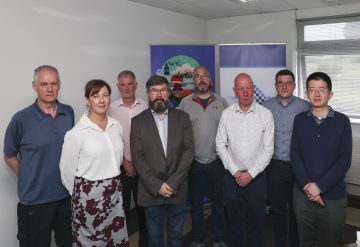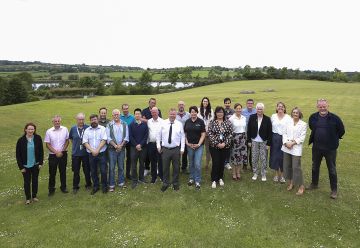The recent Southern Region Challenges and Priorities roundtable event hosted by SETU brought together key stakeholders to discuss water quality monitoring in the southern region.
Held at the Walton Institute, South East Technological University on June 20, the roundtable aimed to reactivate connections from previous projects and address water quality challenges. Organised by Dr Joseph O’Mahony from the School of Engineering, SETU, the event attracted participants from academia, industry, regional authorities, and environmental organisations.
The importance of data
Prof. Peter McLoughlin, Head of the School of Science and Computing at SETU, opened the event by emphasising the importance of data in understanding environmental issues and the power of collaboration in finding solutions. He highlighted the event's celebration of past collaborative projects, such as the Ireland Wales project STREAM, which focused on sensor technologies for remote environmental aquatic monitoring.
Addressing global challenges
Siobhan Rudden presented the work of EU-CONEXUS, the European University for Smart Urban Coastal Sustainability, of which SETU is a partner. She discussed the importance of collaboration and challenge-based learning in addressing global challenges. Dr O’Mahony then presented the previous EU-funded project STREAM, emphasising SETU's central role in supporting regional water quality monitoring. He noted that while the STREAM project has ended, ongoing support from Wexford County Council allows for continued monitoring and data creation for five more years.
The role of remote communications
John Ronan from the Walton Institute, SETU, discussed the role of remote communications and cloud processing in managing environmental data, highlighting its importance in making informed decisions about water quality. Marine Biologist Robert Wilkes from the Environmental Protection Agency spoke about the poor ecological status of many of Ireland’s rivers, lakes, and estuaries, stressing the need for improved monitoring and action.
Dr Ambrose Furey from Munster Technological University detailed his research on eutrophication and cyanobacterial blooms, outlining the health implications for humans and animals. Dr Pierre Lovera from the Tyndall National Institute, University College Cork, presented innovative soil sensors for environmental monitoring and informed fertilisation strategies.
The final speakers included Jason Berry and Benyuan Yu from SETU’s School of Engineering. Berry highlighted a collaborative project with Universidad Católica de Valencia San Vicente Mártir funded by EU-CONEXUS, where undergraduate engineering students created an unmanned surface vessel for environmental monitoring. Mr Yu detailed his PhD research on UV methods for nutrient monitoring.
Donal O’Sullivan from Lab Unlimited, presented the latest commercial technologies for nutrient monitoring.

Need for positive action
Dr O’Mahony concluded the event by stressing the need for coherent and workable plans for positive action. He suggested that future events should focus on identifying areas where monitoring could have the most significant impact. A roundtable discussion followed, considering next steps and the formation of a small stakeholder group to develop approaches for improving water quality in the region.





